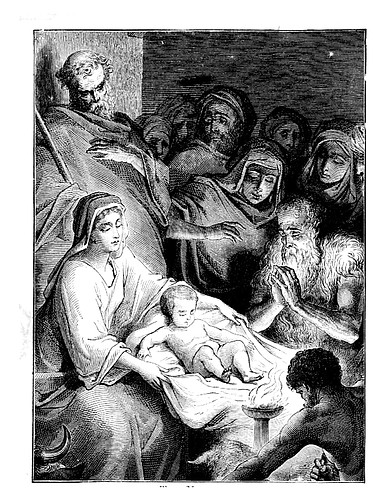- April 16, 2024
-
-
Loading

Loading

Children love to hear their grandparents and parents recount the details of whence their family came, the genealogy of who they are, how they came about and why they are. Indeed, our heritage, family values and principles depend on the continuous retelling of such important events.
This is why we take pleasure each year at this time recounting some of the lesser discussed details surrounding the birth of Jesus Christ. We all know what happened on Christmas — as St. Luke masterfully wrote in his Gospel (see box). But having some of the context that led up to this holy, remarkable day adds to its richness.
In truth, Jesus’ birth is a story for Jews and Christians alike. After all, Jesus’ parents, Mary and Joseph, were Jews. And the setting for this momentous, monumental event was in the heart of the land that God promised to Abraham and Moses — Israel.
The main characters leading up to Jesus’ birth — Mary, Joseph, Mary’s cousin, Elizabeth, and her husband, Zacharias — were anything but celebrities in their day. They were as common as Iowa farmers. And yet, in reality, Mary and Joseph were indeed connected to royalty. Biblical scholars write they actually were cousins, both descendants from the lineage of King David, the longtime king of Israel.
But at that time — which was around 4 B.C. — the Jews of Judea (central Israel) were anything but a privileged, royal class. They were living under the rule of Caesar Augustus and his vast Roman empire and under the unpredictability of the maniac, King Herod, an Arab-Jew who ruled over Jerusalem and Bethlehem as a client king for Caesar Augustus.
“Herod inflicted such outrages upon (the Jews) as not even a beast could have done if it possessed the power to rule over men,” wrote the biblical historian Josephus. What’s more, Herod became infamous for murdering his wife, his wife’s father, her brother, three of his own sons and 300 of his military leaders.
Nonetheless, under Herod, the Jews managed to live with what biblical historian James Edward Talmadge called “some semblance of national autonomy.” They could practice their religion without much interference.
But there was no doubt the Jews did not relish their domination. The Jews kept to themselves and held particular dislike for the Samaritans, a racially mixed people. “The enmity between Jew and Samaritan was so intense that travelers between Judea and Galilee would make long detours rather than pass through Samaria,” Talmadge wrote.
This is what Mary and Joseph would encounter after they received word of Caesar Augustus’ order for a census. He demanded that everyone register in his hometown. For Mary and Joseph, this meant traveling from Nazareth in Galilee in the north to Bethlehem in Judea — an 80-mile journey. That would have taken them right through Samaria. And let’s not forget: Mary was nine months pregnant.
In his gospel on the birth of Christ, St. Luke was sparing on the details of Mary and Joseph’s trip. The fact there are few details must mean it was mostly uneventful. But you could imagine it otherwise: Any woman in her ninth month of pregnancy is physically miserable — can’t sit for long stretches, can’t sleep, constant heartburn, hemorrhoids. So imagine Mary and Joseph traveling in a caravan, with Mary riding much of the trip on a donkey. It was cold at night.
The trip would have taken about four days. On Dec. 23, they had two days to go before reaching Bethlehem. And at this point in the trip, they would just be passing through Samaria. Jewish travelers were marks for bandits.
God was watching over Mary and Joseph, of course. We know they made it, but only to find out that Bethlehem, normally a sleepy little town, was bustling with Jews who had returned to register for the census. There was no room at the inn.
Mary and Joseph, we know, found a stable. But this wasn’t the stable we see on the Hallmark Christmas cards. The stables in those days often were dark, cold caves with “mangers” — animal-feeding troughs carved into the stone walls; they were not wooden cribs padded with dry, neatly arranged hay.
With nowhere else to go, Mary gave birth … under the stars, amid the manure and muck, among the sheep, cows, goats and chickens, no doctors present to administer an epidural, with Joseph, her carpenter husband, assisting as best he could. Those who have witnessed birth know it’s difficult in a hospital bed. Imagine the scene in a smelly, dark, cold cave.
Yet, this lowly, humble setting was the way Jesus Christ, the Savior whom God sent for mankind, came into this world.
Contrast the differences: Caesar Augustus maneuvering for worldly power and the biggest worldwide celebrity of his day; Herod the Great, a regional celebrity, abusing his power over his small dominion in unspeakable ways. They were all about self-centered status, power and ego.
Mary and Joseph were the antithesis. Humble, not materially wealthy, ordinary in all appearances. And yet they were extraordinary.
God sent his messenger, the angel Gabriel, and stunned Mary that she would conceive miraculously and bring forth a son — the Son of the Highest who would “reign over the house of Jacob forever.” She would be his mother.
And Joseph, the quiet carpenter, he fretted over what would happen to Mary, his fiancée, if people found out she was pregnant before they were married. The angel Gabriel gave comfort to Joseph, just as he did to Mary.
And with humility and obedience and far below the radar screen of celebrity status, they carried out God’s will, remembering all the while Gabriel’s assurance to Mary: “For with God, nothing shall be impossible.”
This is our heritage.
Merry Christmas.
(Editor’s note: This originally appeared in the Dec. 23, 2010, edition.)